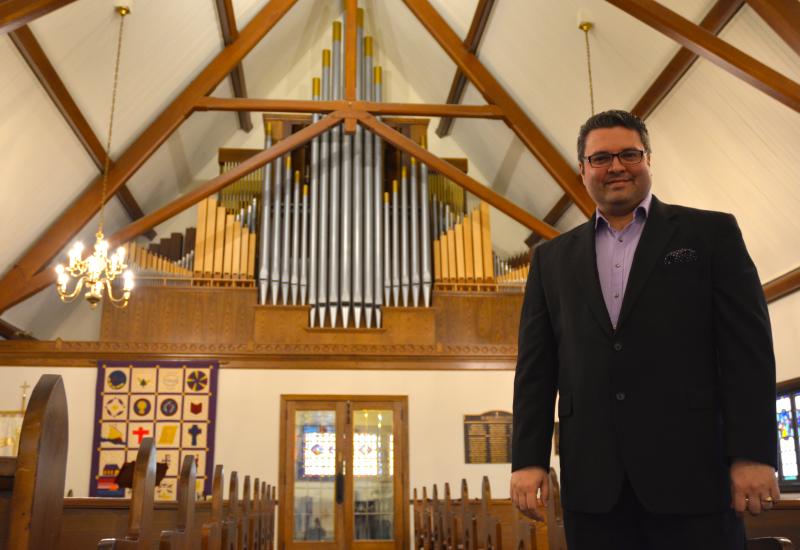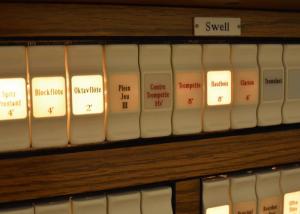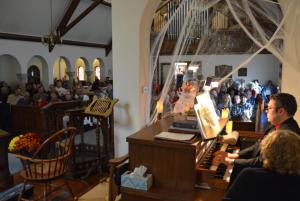Organ music is a calling for Jackson Borges
Jackson Borges said he knew by the age of 12 that he wanted to play music professionally. By the age of 15, more specifically, he said he knew he wanted to play the organ.
“There wasn’t anything else I could really do, and be happy at the same time,” he said. “Music is what I do. It’s who I am.”
Borges has been the organist and music director for All Saints’ Church in Rehoboth and St. George’s Chapel in Harbeson since 2014.
Now 40, Borges said he’s been performing church music since he can remember and playing professionally in churches since he was a teenager. He said his parents don’t play music, and they didn’t really go to church, which is why playing church music was his calling. He said as a young child, his church experience involved going to church with his aunts, whom he calls, “fire and brimstone Pentecostals.”
“We all have to make a living, and I’ve had any number of professional experiences and side jobs,” he said. “But I do believe the best church musicians are the ones who believe they are called to it, because it’s much more than just a job. It’s a greater calling.”
Borges said church music is powerful because it can set the tone for parishioners for the rest of the week.
He said the music should work with the rest of church representatives. “The priest, the choir, the organist,” he said. “It should be the best thing we do all week.”
Borges grew up in Fallbrook, Calif., and he said, while neither of his parents played music, they encouraged him to pursue it. He said he actively sought out a place to practice and was able to gain access to a local church. “I was so enamored,” he said. “I was at that church in every moment of free time. I would skip school to play, which confounded my mom.”
Although his parents were not musicians and didn’t go to church, Borges said they pressed him to take it seriously if that was what he wanted to do. His mom made him take singing lessons, and in addition to the organ, he had to learn how to play the piano and the harpsichord. He’s also an accomplished singer, having performed at the Lincoln Center for the Performing Arts and Carnegie Hall with the New York Philharmonic Orchestra.
Borges said he truly believes the organ chooses the player.
From a young age, 3, he had studied voice and piano, but he can remember hearing and then seeing organ music for the first time at 15.
“It was one of the most interesting things I had ever seen. All those stops, and so many keys. I was just beguiled by it,” said Borges. “It was just one person using all their appendages on this music machine.”
He immediately went to his local Wherehouse Entertainment store – a now-defunct record store chain, mostly on the West Coast – to find some records. He said he first picked up Virgil Fox, who specialized in playing Bach, and Diane Bish, who hosted the television series “The Joy of Music.” Borges said he practices every day. Depending on what musical performance is coming up, he said he may practice as little as two hours, but if there’s an important event or he’s simply trying to learn new music, he may practice up to seven hours.
Borges primary instrument is the All Saints’ organ, which he said is a modern one, with two keyboards for hands and a keyboard for his feet, connected to the pipes with fiber optic cables that run under the church floor. He estimated the All Saints’ organ has 1,500 pipes, some the size of a pencil that aren’t visible because they’re behind the large, show-stopping pipes. He said some of the pipes are designed to sound like other instruments – oboes or flutes – while others don’t imitate anything and sound like an organ.
As musical director for the parish, and in addition to church services, Borges is asked perform a variety of organ music. He develops programs for the Jazz Festival, Sea Witch or other events, like silent movie nights that require him to improvise a full score as the movie is playing. “I put this organ through its paces and it’s never failed,” he said.
Borges plays in Harbeson at St. George’s once a month for church services and when needed for special occasions. The organ at St. George’s is a tracker organ, meaning there’s a physical connection between the keys and pedals and the pipes. He said there are organs throughout the world that are hundreds of years old, and they will continue to produce high-quality music as long as they’re well taken care of.
“Organs are as varied as the people who play them,” Borges said, adding he could bore readers with hours’ worth of information on the organ for All Saints’ and for St. George’s.
In addition to his full-time job locally, Borges is pursuing his doctorate in organ performance from the University of Alabama School of Music, under a program devised by world-renowned organist Dr. Faythe Freese. He said he expects to have the course completed by 2021, and he’s getting it for his own personal enrichment.
“I’ve always had a goal of getting a doctorate because I always looked at it as the pinnacle of academia,” he said.
Not surprisingly, the number of people pursuing doctorates in organ performance is pretty small. Borges said that he’s the only doctorate student at the university right now, and it’s also the first time the program has admitted a student who is not physically in Tuscaloosa. He said he approached a number of universities throughout the country about getting a doctorate while remaining in Delaware, and Freese was the only one who was positive about the idea. He said he travels to Tuscaloosa once or twice a semester to participate in classes for undergraduates, but mostly, he said, his classes and lessons are done over the computer.
Borges credits parish officials with giving him their blessing to pursue the doctorate. “They’ve always been positive about the idea,” he said.
Now in his fifth year as organist and music director, Borges said he’s reached a point where he doesn’t want to move anymore – prior to this parish he held positions with Morristown United Methodist Church, The Princeton Girl Choir, and The American Boychoir, all in New Jersey. He said he’s set up shop in the Cape Region and the parish provides him a lifestyle any professional musician would appreciate.
“This is a great place to live and work,” he said.
Chris Flood has been working for the Cape Gazette since early 2014. He currently covers Rehoboth Beach and Henlopen Acres, but has also covered Dewey Beach and the state government. He covers environmental stories, business stories and random stories on subjects he finds interesting, and he also writes a column called Choppin’ Wood that runs every other week. He’s a graduate of the University of Maine and the Landing School of Boat Building & Design.
























































